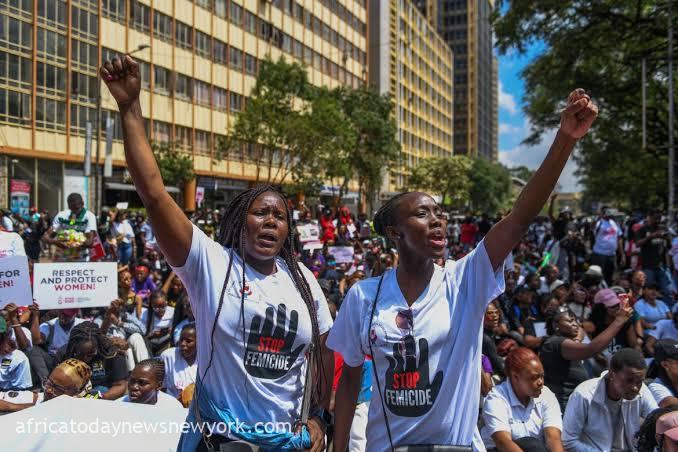A multitude of demonstrators took to the streets in Nairobi over the weekend, rallying against the alarming surge in femicide in Kenya. Shocking the nation, more than a dozen women lost their lives this month.
Advocates flooded the capital’s streets, brandishing signs with messages like “Being a woman shouldn’t equate to a death sentence” and “Patriarchy kills,” with additional placards bearing the names and photos of the victims.
“Stop killing us,” they chanted as they marched towards parliament, bringing traffic to a halt in Nairobi’s central business district.
A minimum of 16 women have fallen victim to violence in Kenya this year, as reported by the media, bringing into focus the government’s characterization of the situation as one of “rising” violence against women.
A case that captured nationwide focus involved the tragic killing of a 26-year-old woman on January 4 in a short-term rental apartment. The suspect, identified by the police as a member of an extortionist gang, targeted women via dating sites.
Scarcely fourteen days later, the nation was confronted with yet another tragic tale as a 20-year-old woman suffered a horrifying fate—strangled, dismembered, and her remains callously stuffed into a plastic bag.
Two individuals are currently in police custody regarding the case; however, they have not been formally charged at this point.
Amnesty International’s Kenya chapter asserted in a statement before the march, “Femicide represents the most brutal form of gender-based violence.”
Read also: Kenya Moves To Make ‘Boda-Boda’ Motorbike Taxis Go Electric
“It is unacceptable and must never be normalised,” the rights group said, calling on authorities to expedite investigations and prosecution of the perpetrators.
At Saturday’s protest, Terry Wangare, a communications officer, said it was “time for Kenya to stand up and make a decision”.
“Nobody cares. If you complain, you are bad,” the 32-year-old told AFP.
Student Faith Claire Wanjiru, 23, who was at her first protest, said she was “angry” and was not going to tolerate the violence.
“Taking someone’s life should not be anyone’s work,” she said.
Organisers of the protest said other marches took place in 10 other regions including the lakeside city of Kisumu and the Indian Ocean port city of Mombasa.
A recent government report from last year discloses that beyond 30% of Kenyan women endure physical violence, with 13% encountering different types of sexual violence.
Human rights watchdogs are resolute in their belief that the provided number is merely a glimpse into the actual magnitude of the cases.
The non-profit Femicide Count, which exclusively tracks reported incidents, documented a minimum of 152 cases of femicide in Kenya last year.
The UN Office on Drugs and Crime’s report for 2022 starkly highlights the devastating toll of 725 women and girls who were murdered in the East African country.

